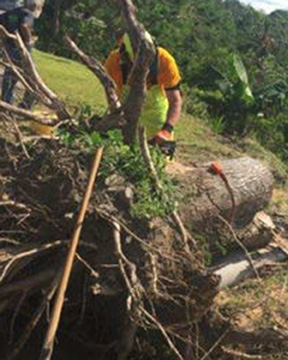It’s not an easy thing to look a hurricane in the face and be thankful for it.
But Mel Johnson said he heard a pastor say that very thing when he visited storm-ravaged Puerto Rico in mid-November.
“He said he was thankful … because now his church had come together and was trying to seek how to reach outside of their church,” said Johnson, director of missions (DOM) for Autauga Baptist Association.
“He said they hadn’t been open before this.”
Ever since Hurricane Maria slammed into Puerto Rico in September, the Caribbean island has been struggling to get back on its feet. Only about a third of the island has power. Residents are leaving in such large numbers that some predict the island could lose a significant part of its population in the next few years.
Loss of membership
And with that goes a large part of the Church.
“When we were there, we met with seven pastors, and some had lost a significant amount of their membership, maybe even 30 percent,” Johnson said. “That’s 30 percent of your church family, your church leadership and your church financial support. Those pastors are really struggling. Churches are working to meet physical needs with very limited resources and need outside support.”
That’s why the North American Mission Board put out a call recently for Baptist associations nationwide to consider adopting a Puerto Rican pastor and his family to help them get back on their feet.
At least 19 Alabama Baptist associations have committed, including Autauga, Elmore and Tallapoosa, who are partnering together for the effort. The list also includes Birmingham, North Jefferson, Shelby, Bessemer, Montgomery, St. Clair, Sand Mountain, Morgan, Limestone, Colbert-Lauderdale, Pickens, Clarke, Washington, Covington, Choctaw and Escambia.
Joining in the effort
Hugh Richardson, DOM for Shelby Baptist Association, noted, “There are 60 or so churches down there and we will be taking on one of them,” he said.
“The island is devastated and the pastors don’t have many resources, but they were looking for ways to reach out.”
That’s why Johnson said response is so important.
“We want to help pastors who have really been under the gun seeing to the needs of their own families but also their church members,” he said. “They have a lot of opportunity to help families who have experienced emotional trauma pick up the pieces in their lives.”
And they are open to Alabama Baptists’ help, he said.
“We met with pastors and talked with them about their needs, prayed with them, encouraged them and shared our vision for coming in and assisting,” Johnson said. “They were wide open to that opportunity. They welcomed that.”
Mark Wakefield, Alabama Baptist State Board of Missions disaster relief and chaplaincy ministries strategist, said the area that he and Johnson visited — the western portion of the island — is the part where Alabama Baptists will be focusing.
“We want to partner with them to help them help their community in whatever ways we can,” he said.
The work is still in the planning stages. For some churches, that partnership will mean some rebuilding of physical structures. For others, that will mean providing ways to filter water, providing other resources or meeting spiritual needs.
Wakefield says he and the DOMs who have signed up to partner with pastors on the island will be going down as a group to meet them sometime in the first two weeks of December.
Opening doors for ministry
“There are a lot of spiritual and emotional needs there, and we see time and time again that the mere presence of people who are willing to come a long way and help opens doors for ministry and gospel conversations,” he said.
Those needs have been on Alabama Baptists’ radar ever since the hurricane hit. Larry Dover, DOM for Franklin Baptist Association, said his churches shipped 25,000 pounds of diapers and other needed supplies to a contact on the island in October soon after the storm.
“Everybody had heard how devastating it was,” Dover said. “The Lord just put it in place where we had those contacts and could get them there quickly.”
Now that statewide response is shifting to a more long-term recovery effort, according to Wakefield.
“It’s not a traditional disaster relief response but we want to come alongside them and provide what they need to get back on their feet and minister to their communities,” he said.






Share with others: